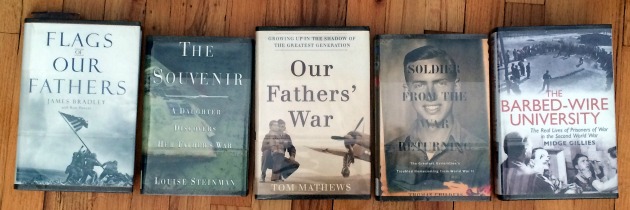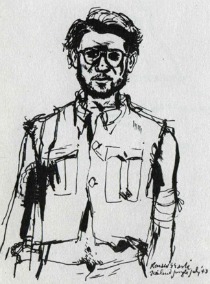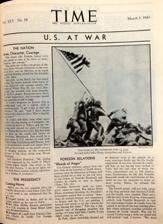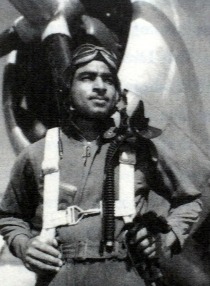Dad's Army: The Second World War's Second Generation
The Library closes for Memorial Day Saturday, May 28 through Monday, May 30. We reopen for normal hours Tuesday, May 31.
The United States, unlike many other countries, separates observances for the armed forces into two days: Veterans' Day in November, honoring those who served and survived, and Memorial Day in May, honoring those who didn't come home. Read any book about any war, though, and you'll find the living not so distant from the dead. Everyone comes home, if only in the memory of the survivors. In these varied volumes, writers grapple with the own fathers' homecomings and dig into the past to explain the sorrows and joys, meaning and torment, of living with the war. The books build their own memorials to the fathers and to those who died at their side.

James Bradley with Ron Powers, Flags of Our Fathers, 2000 (940.54 B)
This beloved bestseller with a blockbuster film adaptation combines a collective biography of the six men famously photographed raising the Stars and Stripes on Iwo Jima with a detailed recounting of that costly battle and the fame that followed. These fellows actually were a cross-section of America, and Bradley goes to almost hyperbolic lengths to paint them as such, from inspiring leader Mike Strank to reservation-reared rifleman Ira Hayes. Bradley interrogates the popular conception of these men as heroes: the longest-lived of them, Bradley's father, would tell his family only that the real heroes were the men who didn't come back. (There's now uncertainty as to whether John Bradley features in THE photograph, but his experience was the flagraisers', regardless.) Despite long personal acquaintance with Japan, Bradley takes the Marines' perspective on the extreme foreignness of "the enemy" for much of the book; this is self-consciously an all-American tale.
Click here for a larger version of the Time magazine page shown in the sidebar.
Louise Steinman, The Souvenir: A Daughter Discovers Her Father's War, 2001 (92 S823 S)
Like James Bradley, Louise Steinman only began to piece together the saga of her dad, Norman, while clearing out his house after his death. Where Bradley beheld a photograph, Steinman held a flag, emblazoned with the Rising Sun and dedicated to a Japanese soldier. Bradley labels the Japanese "the enemy," but Steinman, despite zero acquaintance with Asia, decides to find her dad by finding the Shimizu family and its favored son who died for the Emperor. While all these authors write with compassion for the war-torn, I can't help noticing that it's the one female memoirist who tries hardest to know "the enemy" as another fearful teenager trying to do his duty. Her travels through Japan, the Philippines, and her family's history make for a touching and sometimes funny read.
According to Tom Mathews the younger, the first act of Tom Mathews the elder upon his return from battle in Europe was to reject his then-toddler son as a coward. It was probably a misunderstanding, but it jumpstarted a long struggle for Mathews junior to measure up to his (supposedly) heroic dad. In Our Fathers' War, he grows to understand himself by tracking down nine other sons and fathers who are living out the war's legacy with varying degrees of success. Their stories - from a life-of-the-party compulsive liar to a proud Tuskegee airman (Spann Watson, right) - blend into a grudging admiration for the resilience of the "Greatest Generation."
While Tom Mathews' collective portrait yields some positives, Thomas Childers' unearths deeper tragedy. Solder from the War Returning debunks recent worship of the "Greatest Generation" (such as Flags of Our Fathers!) using three sagas of variously dysfunctional families, one of them his own. Almost everyone who came home suffered from what we now call PTSD, Childers suggests, and its postwar masculine facade was all hollowness. The three vets' contrasting personalities and backgrounds - with one supporting the Air Force in England, one a POW in Germany, and one who must adapt to a terrible combat injury - undergird a psychological portrait of the whole country. Mathews speaks of himself in the first person, Childers in the third. That, and some beautiful writing, give this book the feel of a novel rather than a memoir.
Midge Gillies, The Barbed-Wire University: The Real Lives of Prisoners of War in the Second World War, 2011 (940.5472 G)
Unlike the others, this book is a broad work of scholarship for a general audience. Like the others, it began with Prof. Gillies' interest in her own father, who came out of a German prison camp happy, if plagued with eccentricities. While burying none of the POWs' awful distress and high body count, Gillies finds many silver linings in their experiences, including riotous sports, escapist music and theater performances, and enlightening classes that prepared them to return to civilian life. Artist Ronald Searle (right), who both suffered and benefited from his time as a prisoner, speaks for many in all these books, parent or child: "But mentally and physically marked though we were....We now had in our grasp a thorny, but true, measuring-stick against which to place the things that did or did not matter in life."
A pleasant and meaningful Memorial Day to you and your family.



Disqus Comments